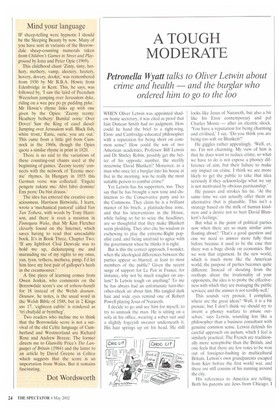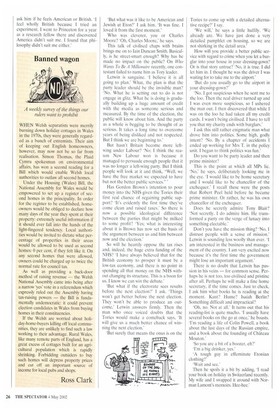A TOUGH MODERATE
Petronella Wyatt talks to Oliver Letwin about crime and health — and the burglar who ordered him to go to the loo
WHEN Oliver Letwin was appointed shadow home secretary, it was cited as proof that lain Duncan Smith had no judgment. How could he hand the brief to a right-wing. Etonand Cambridge-educated philosopher with a reputation for being short on common sense? How could the son of two American academics, Professor Bill Letwin and Dr Shirley Robin, possibly get the better of his opposite number, the stee lily streetwise David Blunkett? Moreover, as a man who once let a burglar into his house at five in the morning, was he really the most suitable person to combat crime?
Yet Letwin has his supporters, too. They say that he has brought a new tone and distinction to the Conservative party and to the Commons. They claim he is a brilliant master of his briefs, a platitude-free zone, and that his interventions in the House, while failing so far to seize the headlines, are so thoughtful that they make Blunkett seem plodding. They also cite his wisdom in eschewing to play the extreme-Right populist card, and being unafraid to agree with the government when he thinks it is right But is this the correct approach, I wonder, when the ideological differences between the parties appear so blurred, at least to most members of the public? Given the recent surge of support for Le Pen in France, for instance, why not be much tougher on asylum? Is Letwin tough on anything? To me he has always had an unfortunate turn-theother-cheek air about him. His tangled dark hair and wide eyes remind one of Robert Powell playing Jesus of Nazareth.
I decide to go and see him for myself, to try to unmask the man. He is sitting on a sofa in his office, wearing a sober suit and a slightly fogeyish sweater underneath it. His hair springs up on his head. He still looks like Jesus of Nazareth, but also a bit like his Eton contemporary and pal Charles Moore — after an electric shock. You have a reputation for being charming and civilised,' I say. 'Do you think you are being too soft on Blunkett?'
He giggles rather appealingly. 'Well, er, no. I'm not charming. My view of him is that he does want to reduce crime, so what we have to do is not expose a phoney difference of aim, but their failure to make any impact on crime. I think we are more likely to get the public to take that idea seriously if they acknowledge what we say is not motivated by obvious partisanship.'
He pauses and strokes his tie. 'At the same time we can actually offer them an alternative that is plausible. This isn't a strategy based on the milk of human kindness and a desire not to hurt David Blunkett's feelings.'
But what is the point of political parties now when there are so many similar aims floating about? That's a good question and one we need to answer more fully than before because it used to be the case that there was a huge divide on economics. But we won that argument. In the new world, which is much more like the American world, the purpose of parties becomes quite different. Instead of shouting from the rooftops about the irrationality of your opponents, the idea is to probe the effectiveness with which they are managing the public services; and the answer is not terribly well.'
This sounds very prosaic, I complain, where are the great ideas? 'Well, it is a bit prosaic, but I don't think we should try to invent a phoney warfare to amuse ourselves,' says Letwin, sounding less like a philosopher than a business consultant with genuine common sense. Letwin defends his careful approach on asylum, which I feel is similarly practical. The French are traditionally more xenophobic than the British. and one feels that there are few votes to he won out of foreigner-bashing in multicultural Britain. Letwin's own grandparents escaped from Kiev before the first world war, and there are still cousins of his running around the city.
His references to America are telling. Both his parents are Jews from Chicago. I ask him if he feels American or British. `I feel wholly British because I tried an experiment. I went to Princeton for a year as a research fellow there and discovered America didn't suit me. I found that philosophy didn't suit me either.'
But what was it like to be American and Jewish at Eton?' I ask him. 'It was fine. I loved it from the first moment.'
Who was cleverer, you or Charles Moore? 'Oh. Charles Moore,' he says.
This talk of civilised chaps with brains brings me on to lain Duncan Smith. Basically, is he street-smart enough? Why has he made no impact on the public? On Who Wants To Be A Millionaire recently, one contestant failed to name him as Tory leader.
Letwin is sanguine. 'I believe it is all going to plan.' What, the plan is that the party leader should be the invisible man? `No. What he is setting out to do is not engage in glitz. What he is doing is gradually building up a huge amount of credit with the media as someone serious and measured. By the time of the election, the public will know about him. And the party as a whole is begging to be thought of as serious. It takes a long time to overcome years of being disliked and not respected. But I think we are beginning to.'
But hasn't Britain become more leftwing under Labour? 'No: I think the reason New Labour won is because it managed to persuade enough people that it was no longer a left-wing party. But I think people will look at it and think, "Well, we have the free market we expected to have but not the better public services."' Has Gordon Brown's intention to pour money into the NHS given the Tories their first real chance of regaining public support? 'It's evidently the first time they've come clean and raised taxes.' So there is now a possible ideological difference between the parties that might be milked to some profit? 'Yes; what is interesting about it is Brown has now set the basis of the argument between us and him between now and the election.'
So will he heartily oppose the tax rises and, indeed, the huge extra funding of the NHS? 'I have always believed that for the British economy to prosper it must be a low-tax economy, and there is no point in spending all that money on the NHS without changing its structure. This is a boon for us. I know we can win the debate.'
'But what if the electorate sees results before the next election?' I ask. `Things won't get better before the next election. They won't he able to produce an outcome,' Letwin answers firmly. Then the man who once voiced doubts that the Tories would make a comeback says, 'It will give us a much better chance of winning the next election.'
'But surely that means the onus is on the Tories to come up with a detailed alternative recipe?' I say.
'We will,' he says a little huffily. `We already are. We have just done a very detailed pamphlet on housing, so we are not shirking in the detail area.'
How will you provide a better public service with regard to crime when you let a burglar into your house in your dressing-gown? Or is that story untrue? `No. it is true. I did let him in. I thought he was the driver I was waiting for to take me to the airport.'
'But do you usually go to the airport in your dressing-gown?'
'No. I got suspicious when he sent me to the loo. Then the real driver turned up and I was even more suspicious, so I ushered the man out. I then discovered that while I was on the loo he had taken all my credit cards. I wasn't being civilised. I have to tell you that my charity ends with burglars.'
I ask this still rather enigmatic man what drove him into politics. Some high, godly intent? 'No. By a chapter of accidents I ended up working for Mrs T. in the policy unit. I began to think politics was fun.'
Do you want to be party leader and then prime minister?
This is the point at which all MPs lie. 'No,' he says, deliberately looking me in the eye. 'I would like to be home secretary and I would like to be chancellor of the exchequer.' I recall these were the posts that Robert Peel held before he became prime minister. Or rather, he was his own chancellor of the exchequer.
Does he secretly admire Tony Blair? 'Not secretly. I do admire him. He transformed a party on the verge of lunacy into something electable.'
Don't you have the mission thing? 'No, I distrust people with a sense of mission.' Letwin is sounding less woolly than ever. 'I am interested in the business and management of the country. I am very excited now because it's the first time the government might lose an important argument.'
There is no doubt that Letwin has passion in his veins — for common sense. Perhaps he is not too, too civilised and pristine after all. Perhaps he will make a fine home secretary, if the time comes. Just to check. I ask him what books he is reading at the moment. Kant? Hume? Isaiah Berlin? Something difficult and impractical?
'Oh, no. Not at all.' It turns out that his reading-list is quite macho. 'I usually have several books on the go at once,' he boasts. 'I'm reading a life of Colin Powell, a book about the last days of the Russian empire, and a book about the founding of Château Mouton.'
`So you are a bit of a boozer. eh?'
'I'm a big drinker, yes.'
'A tough guy in effeminate Etonian clothing?'
'Wait and see.'
Then he spoils it a bit by adding, 'I read your book on holiday in Switzerland recently. My wife and I swapped it around with Norman Lamont's memoirs. Hee-hee.'







































































 Previous page
Previous page